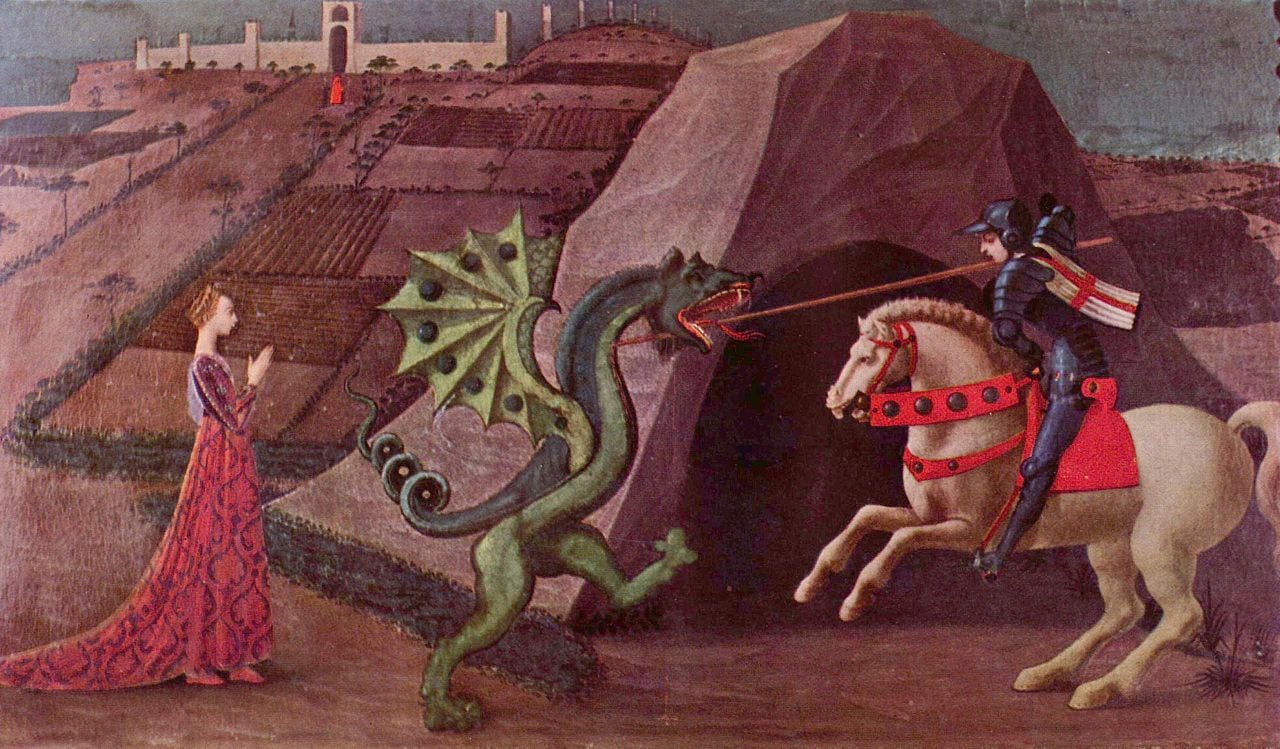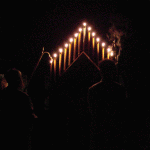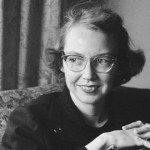
[Editor’s Note: This essay is Part 3 of a series on C.S. Lewis’ Space Trilogy, following Elwin Ransom’s journey through Out of the Silent Planet and Perelandra. Check the archives to access the previous two analyses: “How C.S. Lewis Used Aliens to Show Humanity’s Failings” on February 13, and “What if You Could Stop the Fall of Man” on April 2.]
“‘Matrimony was ordained, thirdly,’” said Jane Studdock to herself, “‘for the mutual society, help, and comfort that the one ought to have of the other.’” She had not been to church since her schooldays until she went there six months ago to get married, and the words of the service had stuck in her mind.”
So begins That Hideous Strength. Published the year that atomic bombs, up to that point both one of the most impressive and most terrifying products of man’s intellect, ended World War II with unparalleled destructive capacity, the novel ruminates upon man’s relationship to science, technology, and to his fellow man. Anticipating 1984 by three years, it shows how totalitarian government oppression can take root in a society purportedly resistant to it.¹ Invoking the legends that have for so long pervaded Britain, it colors and deepens its narrative with those ancient names: Arthur, Merlin, Pendragon. Properly continuing the Space Trilogy of which it is the finale, it nonetheless differs in tone, style, and theme from its predecessors, a logical consequence of bringing its primary action back to Earth (whereas the other two novels primarily take place on Mars and Venus, respectively).
Yet for all its scope and themes, That Hideous Strength is, at heart, the story of a marriage. The couple at the novel’s center is Mark and Jane Studdock, two recently-married young adults whose lives center around the university at which Mark works and Jane studies. The courses the two take throughout the novel diverge significantly, a product of a marriage that itself has somewhat diverged despite its novelty. Mark, a career-conscious academic, strives anxiously through a series of Inner Rings until he finds himself trapped in an organization that represents the antithesis of life and truth. Jane, a PhD student besotted by visions of supernatural intimation, finds herself allied with an organization that upholds life and objective truth. The conflict that unfolds between these competing worldviews comprises the bulk of the novel, imparts some rather John Pauline lessons about marriage and contraception, and suggests how those who wish to see John Paul’s Theology of the Body become a moral standard for society might go about doing so.
The National Institute of Co-ordinated Experiment (N.I.C.E.) appears appealing enough at first.² But it quickly reveals itself the antithesis of what John Paul II believed about man’s relationship to science. Fear of being left out and desire for heightened status coax Mark along the way to becoming part of the N.I.C.E., even as conversations with its members continue to make the reality behind its pleasant name apparent. Outwardly, the N.I.C.E. is simply considered “the first-fruits of that constructive fusion between the state and the laboratory on which so many thoughtful base their hopes of a better world.” But Mark’s time within the institution reveals its many defects. One of its members, a priest, considers the N.I.C.E. a tool for “immanentizing the eschaton” through the means of reason divorced from the spiritual. “‘The Kingdom of God is to be realized here–in this world,’ he says. ‘And it will be….The Kingdom is going to arrive: in this world: in this country. The powers of science are an instrument. An irresistible instrument, as all of us in the N.I.C.E. know.’” Armed with technology, science, and a technocracy all divorced from morality, the N.I.C.E. seeks to impose its will, in direct defiance of God, to make itself into a modern-day Tower of Babel (the subject of the poem from which the novel’s title derives), first over Britain, then over the world. It is a possibility of which John Paul II warns us in his “Letter to Families”:
“…the development of contemporary civilization is linked to a scientific and technological progress which is often achieved in a one-sided way, and thus appears purely positivistic. Positivism, as we know, results in agnosticism in theory and utilitarianism in practice and in ethics. In our own day, history is in a way repeating itself. Utilitarianism is a civilization of production and of use, a civilization of “things” and not of “persons”, a civilization in which persons are used in the same way as things are used…”
The N.I.C.E. represents the full fruition of this dangerous melange of scientism, materialism, and technocracy. And its aim is a brute imposition of its will, against the forces of truth and life.
Quite literally, as it turns out. For Lewis imagines the moon as not only inhabited, but the site of a battle between pro-N.I.C.E. forces who abhor organic life and anti-N.I.C.E. forces who embrace it. Naturally, the terrestrial members of N.I.C.E. look to the moon, “sanitized” by entities who seek wholly to abandon the natural and the organic–chiefly “birth, breeding, and death,” the three things it thinks most offend man’s dignity–as an inspiration. They are “[a] pure race. They have cleaned their world, broken free (almost) from the organic…They do not need to be born and breed and die; only their common people…do that…They are almost free of Nature, attached to her only by the thinnest, finest cord.” Like them, one N.I.C.E. member says, we must “learn how to reproduce without copulation…”
To N.I.C.E., the advance of contraception and decline in sexual morality of their day have already accomplished much of this end, divorcing the unitive and procreative purposes of procreation of which John Paul II speaks. “[Y]ou have already separated the Fun, as you call it, from fertility. The Fun itself begins to pass away,” one N.I.C.E. member says. When the two purposes are totally separated, “then real civilization becomes possible…There will never be peace and order and discipline so long as there is sex. When man has thrown it away, then he will become finally governable.” Abandoning the union of body and spirit for a gnostic abjuring of the body, the N.I.C.E. hopes to bring its elite to the status of the evil spirits we are not surprised to learn guide it–at the expense of all other life.
Against all of this stands by contrast a fairly modest group, whose members embrace the natural, the organic, and the God-ordained. Their resistance in the face of N.I.C.E.’s artificially- enhanced tyranny, accomplished by fashioning itself as the faux-vanguard of progress (and through some tyranny of its own), becomes less surprising when it is revealed that their Director is none other than Elwin Ransom himself. Ransom seeks to defend the Earth against the foes he vanquished on two other worlds by upholding principles that align well with John Paul II’s Theology of the Body.
And from these principles flows a much more accurate interpretation of the purported lunar utopia, a place in which genuine human sexuality has long faded away. For there, “the womb is barren and the marriages cold. There dwell an accursed people, full of pride and lust.” These prideful people, having separated the unitive and procreative purposes of procreation, have replaced it with the selfish utilitarianism that follows their division. “There when a young man takes a maiden in marriage, they do not lie together, but each lies with a cunningly fashioned image of the other, made to move and to be warm by devilish arts, for real flesh will not please them, they are so dainty…in their dreams of lust.” Sexual intercourse there has become mutual masturbation. And, as is common in totalitarian visions from Plato’s Republic to Huxley’s Brave New World, they breed “their real children by vile arts in a secret place.”
The marital struggles of Mark and Jane, reflected by their intentional decision not to have children, relate directly to this lunar conflict. For their marriage has succumbed to the utilitarianism of the anti-organic lunar race. As one character, a man out of our time but familiar with the world of the moon, remarks: “Of their own will they are barren: I did not know that the usages of [the lunar race] were so common among you.” And yet the dual journeys of the two characters hold out hope. For Mark’s experience with the N.I.C.E. leads down a road one might call “the gradual one–the gentle slope, soft underfoot, without sudden turnings, without milestones, without signposts,” forcing him to reject standard decency, ethics, morality, and then, ultimately–in an anticipation of Orwell’s Room 101–objective truth itself in favor of the brute force of the N.I.C.E.’s will.
Only good fortune, good sense, and the defeat of the N.I.C.E. by the Director’s group draw Mark out of this world and force him to realize that he was wrong all along–about the N.I.C.E., about its beliefs, and, most important for him, about his marriage. He concludes that he has failed to exist in reciprocal, mutual self-gift with his wife, who offered him everything while he gave her nothing in return. “He had gone wrong only in assuming that marriage, by itself, gave him either power or title to appropriate that freshness,” he admits. “As he now saw, one might as well have thought one could buy a sunset by buying the field from which one had seen it.” Only by reciprocating this self-gift can he save their marriage. Jane herself has doubts about rekindling it (“How if Mark did not want her?–not tonight, nor in that way, nor any time, nor in any way? How if Mark were not there at all?) but nonetheless embarks on the quest for rejuvenation when she discerns that Mark has changed his own mind about it as well.
The N.I.C.E. and the Director’s group, Mark and Jane, the anti-Civilization and the Civilization of Life–all represent the same dichotomy, until the book’s end, when the latter wins out in each case. But Lewis wisely portrays this as only one battle. For the naked utilitarianism of the anti-Civilization, which he calls “[t]he poison…brewed in these West lands,” has “spat itself everywhere, by now…” How can those who care deeply about a relationship between persons informed by the Theology of the Body bring its central ethic into prominence? Lewis offers a simple but not an easy answer: We must change the culture, starting by living lives consistent with John Pauline principles, and then spreading outward to the lives of our peers and the character of our institutions by our examples. For while proponents have lost much ground, the divine lingers in the world and its people. Therefore, “[t]he whole work of healing Tellus [another name for Earth] depends on nursing that little spark, on incarnating that ghost, which is still alive in every real people, and different in each…” It is now up to us to put his advice into practice.
¹Read George Orwell’s favorable review of That Hideous Strength
²N.I.C.E., an acronym eerily lifted by the U.K.’s National Health Service for a health rationing agency several decades later
***
Jack Butler, a 2015 graduate of Hillsdale College, is a writer living in Washington, D.C.












